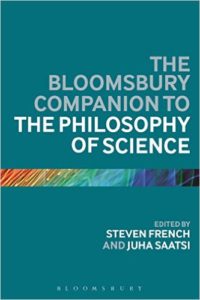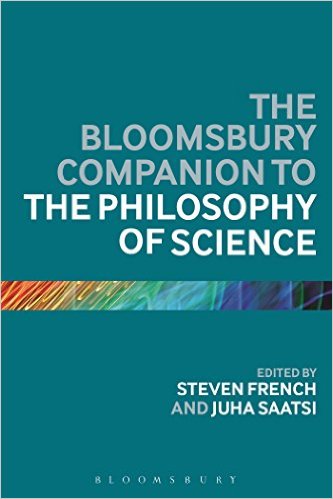 The Bloomsbury Companion to the Philosophy of Science, edited by Steven French and Juha Saatsi (Bloomsbury, 2014), 475.
The Bloomsbury Companion to the Philosophy of Science, edited by Steven French and Juha Saatsi (Bloomsbury, 2014), 475.
Usefulness for Biblical Studies
The philosophy of science plays into many issues in biblical studies. Current models of scientific inquiry impinge on issues such as the historicity of Adam, the age of the earth, evolution, and genealogical information. Organizations such as BioLogos are trying to bridge the disciplines of science and biblical studies, but a level above science is how science is actually done.
One scholar recently said he essentially disbelieves parts of the Bible because scientists tell him evolution is true and he has no ability to question them since he is not a scientist. I suggest that studying a little bit of philosophy of science would have shown this scholar that science is not infallible, nor are its methods of inquiry. This Bloomsbury Companion would be a great resource for biblical scholars to get a grip on these sorts of issues.
Contents
Part I of this volume relates philosophy of science to the major disciplines of metaphysics, epistemology, and the history of science. The epistemology chapter would be especially helpful for theologians, since it covers internalism and externalism, Bayesianism, abductive reasoning (which N. T. Wright keeps advocating), Quine’s naturalized epistemology, and the difference between knowledge and evidence. While this is applied to scientific inquiry, much of it can be transferred directly to the realm of historical inquiry with profit.
Part II covers current research and issues. The first half covers sporadic topics such as explanation, Bayesian Confirmation Theory (which is a complicated issue, so an entire essay is welcome), causation and the sciences (a problem stemming from Hume), and even an entire chapter on Hume and scientific realism. The second half of Part II covers the philosophy of particular branches of science, such as physics, biology, economics, etc. While these issues are not directly relevant to biblical studies, getting familiar with the issues involved would help one better think through how much science has a claim on our beliefs.
Part III covers new directions for the future and also provides a chapter chronicling the history of the philosophy of science. This last chapter (ironically) may be the first essay you would want to consult, because reading about the history of the philosophy of science will give you the critical tools you need to really think about how science is done and how much we must integrate into our theology and historiography.
Evaluation
I would have liked to have seen chapters on science in the ancient world and an inferred philosophy of science, as well as a chapter devoted to analyzing Thomas Kuhn’s paradigm shifting work and reactions to it (The Structure of Scientific Revolutions). Nevertheless, no companion can cover everything.
I commend this volume as a useful introduction to approaching science. Every biblical scholar should study a little philosophy of science, and this is a great volume to jump around in and read relevant chapters. Start with the final chapter and move back to Part I, especially the epistemology chapter. Then select chapters that interest you.
Preview or buy it here on Amazon.


